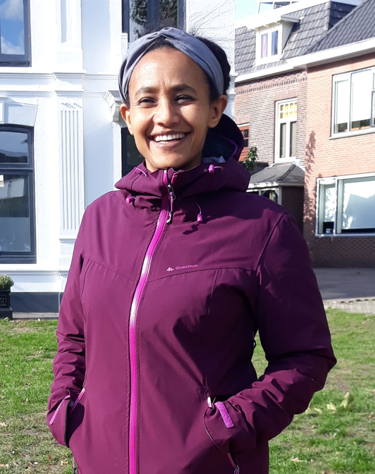Integrating WSN, Citizen Science, and Remote Sensing to Power a Data-Driven Decision Support System for Resilient Small-Holder Agriculture
Amsale Bayih is a PhD student in the department of Geo-information Processing. (Co) Promotors are dr. R.A. By and dr. J.M. Morales Guarin from the faculty of Geo-Information Science and Earth Observation, University of Twente and dr. Y. Assabie from the Addis Ababa University of Ethopia.
 This dissertation presents a comprehensive framework for enhancing smallholder agricultural resilience through the integration of Wireless Sensor Networks (WSN), Citizen Science (CS), and Remote Sensing (RS) technologies. Conducted in the South Wollo zone of the Amhara region, Ethiopia, the research addresses the persistent challenges of data scarcity, low productivity, and limited access to expert agricultural guidance in smallholder farming systems.
This dissertation presents a comprehensive framework for enhancing smallholder agricultural resilience through the integration of Wireless Sensor Networks (WSN), Citizen Science (CS), and Remote Sensing (RS) technologies. Conducted in the South Wollo zone of the Amhara region, Ethiopia, the research addresses the persistent challenges of data scarcity, low productivity, and limited access to expert agricultural guidance in smallholder farming systems.
The study adopts a Design Science (DS) methodology, progressing through problem investigation, system specification, design, implementation, and evaluation. It develops a modular, scalable, and participatory data infrastructure that enables continuous farm-level monitoring and decision support. The research is structured around five core objectives: (1) configuring IoT-WSN for real-time soil monitoring, (2) designing a participatory CS platform for soil nutrient analysis, (3) constructing a spatiotemporal Agriculture Data Cube (ADC), (4) developing a data-driven knowledge base, and (5) implementing a fuzzy logic-based Agricultural Decision Support System (AgDSS).
Key innovations include the deployment of a LoRaWAN-based WSN tailored to resource-constrained environments and a collaborative CS framework engaging local youth and extension workers in soil data collection using low-cost kits and mobile applications. These data streams are harmonized within the ADC, which integrates in-situ, RS, and ancillary datasets. Machine learning models, particularly Random Forest regressors, are employed to impute missing data and estimate soil properties and crop yields.
The AgDSS leverages fuzzy logic and association rule mining to generate interpretable, context-aware recommendations. A Mamdani-type inference engine processes user inputs and environmental data to support decisions such as yield forecasting and soil health assessment. The system is validated through field experiments and expert feedback, demonstrating its potential to enhance data-driven decision-making in smallholder agriculture.
Despite challenges such as data gaps due to conflict and environmental constraints, the study confirms the feasibility and value of integrating digital technologies in underserved farming communities. It concludes with recommendations for future work, including the integration of real-time weather data, the expansion of decision domains, and interdisciplinary collaboration to refine models and scale the system.
This research makes a significant contribution to the field of digital agriculture by providing a replicable, inclusive, and adaptable framework for empowering smallholder farmers through data-driven innovation.





